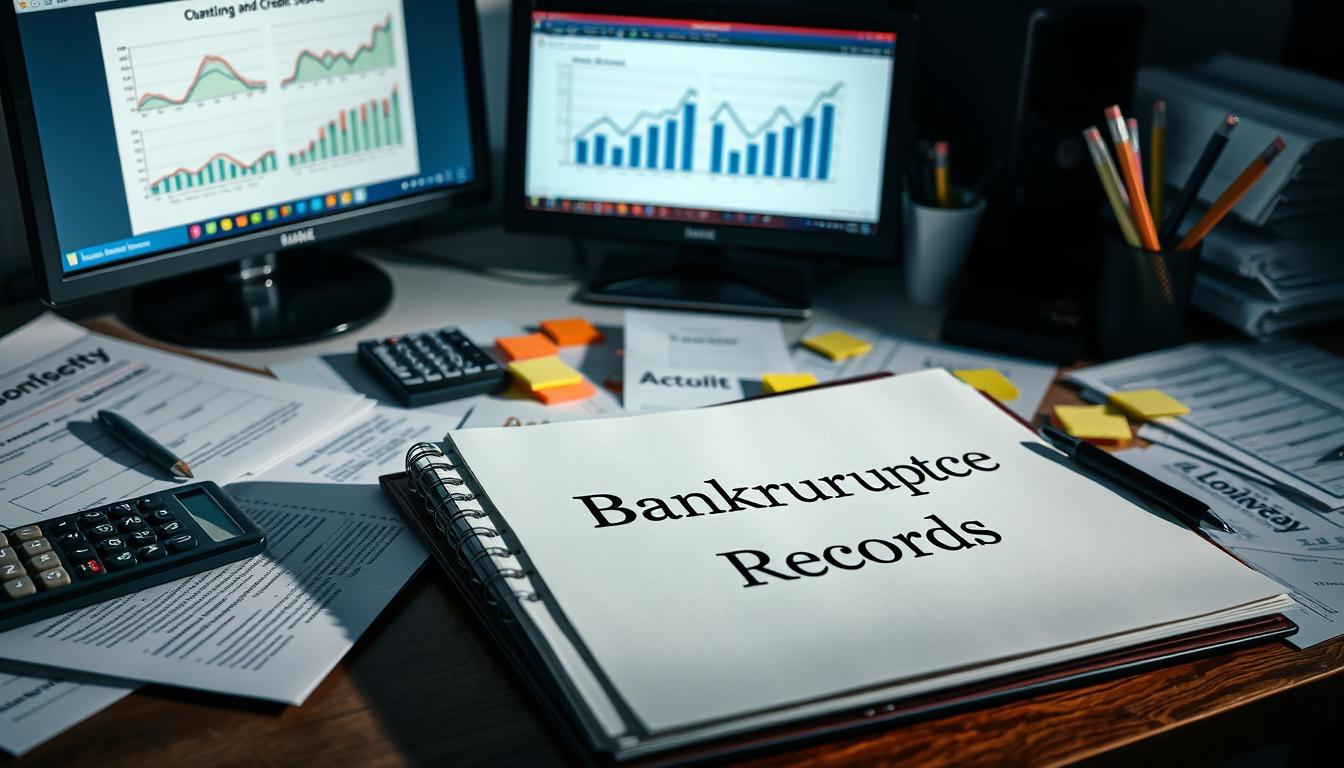Your credit report is a vital financial document. It shows lenders and creditors how creditworthy you are. Public records in this report can greatly affect your credit profile.
Let’s explore public records on your credit report. We’ll look at their types, importance, and ways to handle them effectively.
Key Takeaways
- Public records on your credit report can include bankruptcy filings, tax liens, and court judgments.
- These records can have a substantial influence on your credit score and your ability to secure loans, credit cards, or rental agreements.
- Understanding the impact of public records is vital for maintaining a healthy credit profile and taking proactive steps to address any inaccuracies or resolve outstanding issues.
- Credit repair services can be instrumental in navigating the complex process of removing erroneous public records from your credit report.
- Developing strategies to improve your credit score despite the presence of public records can help you regain financial stability and access better credit terms.
What is a Public Record on a Credit Report?
A public record on a credit report shows your publicly available financial history. This includes bankruptcy filings, tax liens, and court judgments. These public record on credit report can greatly affect your creditworthiness.
Lenders and creditors use this information to assess your financial responsibility. They also use it to determine the level of risk you pose.
Types of Public Records Impacting Credit
The most common types of public records on credit reports are:
- Bankruptcy public records – Filings for personal bankruptcy, which can remain on your credit report for up to 10 years.
- Tax lien public records – Unpaid taxes that have resulted in a legal claim against your property.
- Judgment public records – Court-ordered decisions that you owe a debt, which can be reported for up to 7 years.
Significance of Public Records in Credit Evaluation
These public record on credit report can significantly impact your credit score. They can affect your ability to get credit, loans, or housing.
Lenders see these records as signs of financial instability. This may make them less willing to extend credit to you.
Understanding credit report errors and addressing them is crucial. It helps maintain a healthy credit profile.

“Public records on a credit report can have a lasting impact on your financial well-being, making it essential to address any inaccuracies or negative information.”
Bankruptcy Public Records
Bankruptcy filings are crucial entries in your credit report. They allow individuals or businesses to discharge some or all debts. This legal process provides a fresh financial start.
Bankruptcies can remain on your credit report for up to 10 years. The duration depends on the type of bankruptcy filed. Different types include Chapter 7, Chapter 11, and Chapter 13.
Chapter 7 bankruptcy involves liquidating assets to repay creditors. It can stay on your credit report for up to 10 years. Chapter 13 bankruptcy includes a court-approved repayment plan. It may remain on your report for up to 7 years.
A bankruptcy on your credit report significantly impacts your creditworthiness. Lenders may view you as a higher risk. This can make securing loans or credit cards more challenging.
Bankruptcy can also affect your ability to rent an apartment. It may impact your chances of obtaining insurance or finding employment.
| Bankruptcy Type | Maximum Time on Credit Report |
|---|---|
| Chapter 7 Bankruptcy | 10 years |
| Chapter 13 Bankruptcy | 7 years |
Understanding your rights after bankruptcy is crucial. Explore options for addressing inaccuracies in your credit report. Disputing public records with credit bureaus can help improve your credit profile.

“Bankruptcy is not the end of the world. It’s a chance to start over with a clean slate.”
Take proactive steps to address bankruptcy-related issues. This can help you rebuild your credit over time. With effort, you can work towards achieving your financial goals.
Tax Lien Public Records Understanding Tax Lien Public Records
Tax liens are public records showing the government’s claim on property due to unpaid taxes. They can appear on credit reports and harm your credit score. This can make it hard to get loans, credit cards, housing, or jobs.
Tax lien public records can stay on your credit report for up to seven years. They impact your creditworthiness even after you’ve paid the debt. It’s vital to understand their nature and effects.
Resolving Tax Lien Public Records
If you have a tax lien on your credit report, you can take action. Here are some steps to address it:
- Pay the outstanding tax debt in full. This will help remove the tax lien from your credit report, but it may still take some time for the credit bureaus to update your records.
- Negotiate a payment plan with the IRS or your state tax agency. This can help you resolve the tax debt and potentially have the tax lien removed from your credit report.
- Dispute any inaccurate or outdated tax lien public records with the credit bureaus. Provide documentation to support your claim, and the bureaus may be required to remove the erroneous information.
Taking action on tax lien public records can improve your credit profile. It can help you regain access to financial opportunities. Don’t let tax liens hold you back.

“Removing tax lien public records from your credit report can be a complex process, but it’s essential for rebuilding your credit and achieving your financial goals.”
Judgment Public Records
Judgment public records are court rulings against individuals, often for unpaid debts. These judgments can severely damage credit scores. Resolving them is vital for maintaining good credit.
Judgments can make it hard to get loans or secure housing. They can stay on credit reports for up to seven years.
Impact of Judgments on Credit Scores
Court judgments are serious marks on credit reports. They can cause a big drop in credit scores. This makes it tougher to get loans or credit cards.
Judgments can also affect job opportunities. They remain on credit reports for seven years. During this time, they limit financial options.
Resolving Judgment Public Records
- Pay the judgment in full: The most straightforward way to resolve a judgment is to pay the outstanding balance in full. This can often lead to the judgment being removed from the credit report.
- Negotiate a settlement: In some cases, it may be possible to negotiate a settlement with the creditor, where a reduced amount is paid in exchange for the judgment being removed or updated on the credit report.
- Dispute the judgment: If the judgment is inaccurate or the result of identity theft, individuals can dispute the record with the credit bureaus and provide evidence to support their case.
Fixing judgment records can be tricky. It’s key for boosting credit and regaining financial chances. Getting help from credit repair services or lawyers can be useful.

“Resolving judgment public records is a crucial step in rebuilding one’s credit profile and regaining financial opportunities.”
Removing Inaccurate Public Records
Found inaccurate public records on your credit report? You have the right to dispute these errors. This step is vital for maintaining your credit profile’s accuracy.
It ensures your financial information is correctly represented. Disputing errors protects your credit integrity and financial future.
Disputing Errors with Credit Bureaus
To dispute inaccurate public records, provide evidence to credit reporting agencies. This may include court documents or payment records.
These documents should contradict the credit report errors. Proper evidence strengthens your case for correction.
- Carefully review your credit report and identify any public records that are inaccurate or incomplete.
- Gather the necessary evidence to support your claim that the public record is incorrect.
- Contact the appropriate credit reporting agencies and initiate a formal dispute using their established procedures.
- Follow up with the agencies to ensure your dispute is being investigated and processed in a timely manner.
Successfully removing inaccurate public records can boost your credit score. It enhances your overall financial profile.
Taking action to dispute public record errors improves your credit information’s accuracy. This can lead to better financial opportunities in the future.
Credit Repair Services for Public Records
Credit repair services help with public records on credit reports. They identify and dispute wrong information. These services also develop strategies to improve your credit over time.
Credit repair companies have experts in credit reporting systems. They can help remove public records from your credit report. Their team reviews your credit report for errors.
They submit disputes to credit bureaus for you. They guide you on handling bankruptcies or tax liens. They also monitor your credit report and score.
- Thoroughly reviewing your credit report to identify any errors or inaccuracies
- Submitting detailed disputes to the credit bureaus on your behalf
- Providing guidance on how to address legitimate public records, such as bankruptcies or tax liens
- Monitoring your credit report and credit score to ensure continued improvement
Credit repair services create plans to boost your credit profile. They suggest responsible credit use and timely payments. They also help address negative items on your report.
“Credit repair services can be a game-changer for individuals who are struggling to navigate the complexities of public records on their credit report.”
With credit repair experts, you can take steps to remove public records. They help dispute public records hurting your credit score. This can lead to better financial chances.
The public record on credit report and Its Impact on Credit Scores
Your credit report contains vital information about your financial health. Public records in this report can significantly affect your credit score. These records influence your ability to get loans and credit cards.
Public records include bankruptcy filings, tax liens, and court judgments. They can stay on your report for years, severely damaging your credit score. These records may account for up to 30% of your credit score calculation.
| Type of Public Record | Typical Impact on Credit Score |
|---|---|
| Bankruptcy | Severe, can drop score by 150-200 points |
| Tax Lien | Moderate, can drop score by 100-150 points |
| Judgment | Significant, can drop score by 100-150 points |
To maintain a good credit score, address any public records on your report. You can dispute incorrect information or negotiate with creditors. Credit repair services might also be helpful in some cases.
The impact of public records on your credit score isn’t permanent. With effort and responsible credit management, you can improve your financial situation. Overcoming these challenges is possible with dedication and smart financial decisions.
Strategies to Improve Credit Despite Public Records
Public records on your credit report don’t mean you can’t improve your score. You can take steps to boost your creditworthiness over time. By using credit wisely and paying on time, you can show financial reliability.
Responsible Credit Utilization
Keep your credit card balances low compared to your limits. Experts suggest using less than 30% of your available credit. This shows lenders you’re trustworthy, even with public records on your report.
Use credit responsibly and avoid maxing out your cards. This strategy can positively impact your credit score over time.
Making Timely Payments
Paying bills on time is crucial for improving your credit score. It’s the most important factor in determining your creditworthiness. Consistent on-time payments show financial discipline, even with public records.
Set up automatic payments or reminders to stay on top of your bills. This can help you steadily rebuild your credit profile.

